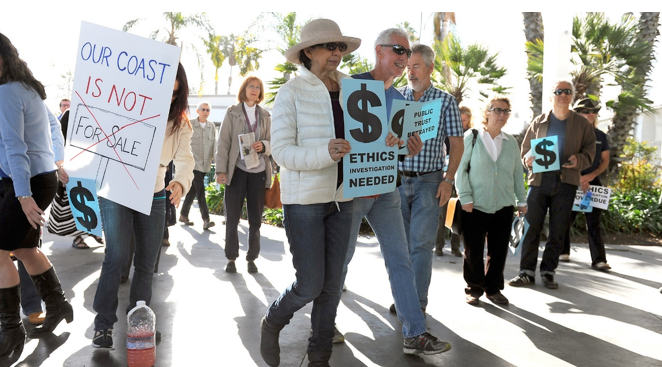CommentsTHIS IS WHAT I KNOW-Two bills that would have improved transparency at the California Coastal Commission were defeated last week, disclosing a slant toward business, labor, and pro-development interests. A third measure that would mandate one of the commission’s fifteen members to be from a low-income minority community that is impacted by environmental problems did pass the Assembly and is headed for Governor Brown’s desk.
Senate Bill 1190, sponsored by Sen. Hannah-Beth Jackson (D-Santa Barbara), would have banned ex-parte contacts between commissioners and developers, lobbyists, environmentalists and others with an interest in the commission’s decisions. Forty-seven assembly members voted against the bill, with 21 abstentions. Only twelve members supported the bill.
Jackson’s bill had an endorsement from the Coastal Commission and was passed in the Senate but the measure faced resistance in the Assembly from a roster of organizations, including the California Farm Bureau Federation, the California Chamber of Commerce, the Western States Petroleum Assn., and the State Building and Construction Trades Council of California, as well as the California League of United Latin American Citizens and lobbyist Susan McCabe who represents development interests.
The bill’s opponents used the “free speech” argument alleging that the ban would restrict labor representatives, developers and others from providing their views to commission members. The California Coastal Act requires commissions to stick to issues like public coastal access and environmental issues, not business or economic benefits. If commissioners do not follow these guidelines, their decisions can be challenged in court.
Supporters of the bill state that most ex-parte contacts are between commissioners and developers looking for approval along California’s coastline, which can impact the fairness of subsequent proceedings. In lieu of ex-parte meetings, developers and others, they say, should address their concerns during public hearings and not behind closed doors.
Assembly Bill 2002, sponsored by Assembly Speaker Toni Atkins (D-San Diego) and Assemblyman Mark Stone (D-Monterey Bay), would have required anyone who lobbies the Coastal Commission to register with the state and to disclose clients with business before the commission. The bill would also have fast-tracked reporting of ex-parte meetings and made the disclosures more accessible to the public.
The measure faced an uphill battle due to the two-thirds vote requirement, as it would have amended the Political Reform Act. The bill failed to pass in the Senate. Opposition to the bill included lobbyists, construction, real estate and agricultural interests, the same groups that also worked to defeat the ex-parte bill.
The beleaguered Coastal Commission has been under scrutiny by courts and the media for its lack of transparency in reporting ex-parte meetings or reporting them late and without much detail, all of which appear to violate statutory requirements. Just over two weeks ago, Spotlight on Coastal Corruption and attorney Cory Briggs filed a lawsuit in San Diego County Superior Court, alleging that five coastal commissioners (Chairman Steve Kinsey, Erik Howell, Martha McClure, Wendy Mitchell and Mark Vargas) had violated ex-parte disclosure rules 590 times.
Until we see complete transparency and a ban of ex-parte meetings, the Coastal Commission will answer to special interests with deep pockets. Our miles of coastline will be up for grabs, sold to the highest bidder. You could lose you California beach. I ask again, where the hell is the outrage!?
(Beth Cone Kramer is a Los Angeles writer and a columnist for CityWatch.) Edited for CityWatch by Linda Abrams.
Sidebar
Our mission is to promote and facilitate civic engagement and neighborhood empowerment, and to hold area government and its politicians accountable.

 CityWatch Los Angeles
Politics. Perspective. Participation.
CityWatch Los Angeles
Politics. Perspective. Participation.
13
Fri, Feb















